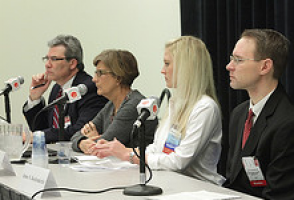
A recent study focusing on a unique subtype of high-risk B-cell acute lymphocytic leukaemia (ALL) has used advanced genome sequencing to identify new targets for the treatment of this deadly blood cancer.
ALL is the most common paediatric malignancy, representing almost one-third of all childhood cancers. In particular, relapsed B-cell ALL remains a leading cause of cancer death in young patients. There are multiple subtypes of ALL with different genetic abnormalities that influence disease outcome and response to therapy, but most current treatments affect all dividing cells, so new targeted therapies that might be effective against non-dividing cells may be required to improve the outcome of this disease.
With the introduction of novel genomic sequencing technologies, researchers can now identify genetic alterations including mutations, chromosomal rearrangements, and structural variations that drive the initiation and progression of leukaemia and, importantly, may provide new targets for the development of novel therapies. Prior research had identified a new subtype of B-cell ALL with poor outcome and a gene expression profile similar to that of Philadelphia chromosome (Ph+) ALL (known as Ph-like ALL). Notably, Ph+ ALL is characterized by the expression of BCR-ABL1, which can be effectively treated with tyrosine kinase inhibitors such as imatinib.
To understand the genetic basis underlying Ph-like B-cell ALL, a cooperative research study composed of the Children’s Oncology Group, St. Jude Children’s Research Hospital, the National Institutes of Health, and British Columbia Genome Sciences Center analyzed the transcriptome (RNA sequence) of 11 Ph-like patients by next-generation sequencing. The team also conducted whole genome sequencing on two of the patients, a process that has become increasingly attractive to understand the full genetic profile of certain types of cancer patients.
From detailed genetic analysis, new rearrangements, structural changes, and sequence mutations that activate tyrosine kinases and cytokine receptors were identified in 10 of the 11 cases studied. Importantly, these alterations were sensitive to kinase inhibition with existing treatments such as imatinib. The results suggest that the use of genomic sequencing can be used to identify the full spectrum of genetic alterations in ALL, enabling clinicians to identify high-risk patients who may be candidates for more aggressive, targeted treatment regimens.
“Our data support screening patients upon diagnosis to identify those who have specific high-risk ALL, which will help us understand the genetic changes driving this specific type of cancer and determine those patients who may benefit most from specific targeted treatments,” said lead author Kathryn G. Roberts, PhD, Postdoctoral Fellow in the Department of Pathology at St. Jude in Memphis, Tenn. “We’ve been working toward the goal of tailoring therapy to individual patients for years, but with new technologies such as genome sequencing we’re getting much closer to the reality of individualized treatments and an improved chance of survival.”
Source: ASH
The World Cancer Declaration recognises that to make major reductions in premature deaths, innovative education and training opportunities for healthcare workers in all disciplines of cancer control need to improve significantly.
ecancer plays a critical part in improving access to education for medical professionals.
Every day we help doctors, nurses, patients and their advocates to further their knowledge and improve the quality of care. Please make a donation to support our ongoing work.
Thank you for your support.